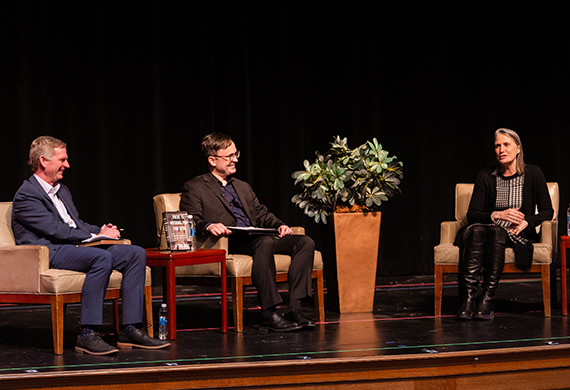Marist Authors
Marist faculty have recently published books on topics spanning the social emotional components of teaching, free speech, and designing effective digital badges.
October 7, 2020—Here’s a rundown on new books by Marist faculty.
Adjunct Instructor of Psychology David Bunn says, “Psychology is not a subject, but a lifestyle. I essentially teach my students how to use the principles of psychology to create a life of success, happiness, and victory.” And he means it—Bunn has been with Marist for thirteen years and has been a mental health clinician for twenty-six years, working with abused children and their families, people with chronic mental illness, crime victims, and adults with intellectual disabilities. He teaches an array of courses at Marist including abnormal psychology and child development, and also provides New York State mandated reporter training to students enrolled in the Social Work Program and the Licensed Mental Health Counseling Program.
His wealth of experience as a teacher and practitioner has given him a distinct point of view. “My philosophy is that the academic environment should be therapeutic. As a clinician, I don’t just teach psychology. I demonstrate it by using the principles of psychology to teach it. As such, I create an experience for my students that is academically sound, therapeutic in nature, and relationship driven.” His book for teachers and aspiring teachers, They Aren’t Just Students: Making the Connection, “is focused on how to establish and maintain meaningful relationships with students.”
Bunn wrote the book primarily to share the techniques that he has found to be effective in the classroom. “But,” he added, “I also wanted to write a book that would have been useful to me when I began teaching twenty-one years ago. There was no such book. And I wanted to leave my ‘mark.’ I wanted to contribute something to the field and have something to show for what I have done.”
The book may be particularly useful in the age of COVID-19 when teachers are being asked to focus more on social emotional well-being. “In this tumultuous time, it is more important than ever that teachers overtly demonstrate support and compassion for the students,” Bunn noted. “My book reminds teachers not only to do that, but also provides numerous techniques explaining how to do it. I discuss things like sending an email to a student after class to say, ‘I appreciated your input today.’ Or sending a supportive e-mail to the entire class on a Friday afternoon that says, ‘You all did a fabulous job this week. I'm proud of you.’ I do these kinds of things all the time, and on my student evaluations, they never fail to acknowledge those actions as the most important.”
For Bunn, it’s simple: “If a teacher wants the students to know they are cared about, then the teacher must overtly demonstrate that.”
They Aren’t Just Students was published by Resource Publications earlier this year and is available from Amazon.
- Julia Fishman
Lynn Eckert, Associate Professor of Political Science, has written an in-depth and comprehensive book about freedom of speech and the regulation of pornography in her recently released book, Free Speech Law and the Pornography Debate: A Gender-Based Approach to Regulating Inegalitarian Pornography.
The book explores “free speech doctrine itself, its rules and assumptions, as a way to explain why law validates some claims about pornography and submerges others,” Eckert said. The book is aimed at an academic audience and could be used in a variety of disciplines such as gender & the law, feminism, the First Amendment, political theory, and constitutional law.
The book is a product of Eckert’s dissertation where she was able to develop a new scholarly contribution to the debate about free speech and pornography regulation. “The idea of discursive effects playing a role in the understanding of how speech harms and placing such a theory within a constitutional legal framework is a new scholarly contribution,” Eckert said.
While this project has been a significant part of Eckert’s academic life, she is looking forward to her next project. “It is both a relief and a loss to have finished. I am currently working on my next book project which assesses the gay rights legacy of Supreme Court Justice Anthony Kennedy,” Eckert said.
Free Speech Law and the Pornography Debate: A Gender-Based Approach to Regulating Inegalitarian Pornography is available on Amazon.
- Kenneth Guillaume
Joey Fanfarelli, Associate Professor of Games & Emerging Media, released Designing Effective Digital Badges: Applications for Learning in 2019. Fanfarelli wrote this book to provide a complete understanding of what a digital badge is and the effective and responsible implementation of them.
In essence, Fanfarelli’s book is academic, but it has practical applications, too. “I use education broadly in this book. Yes, it’s for a learning audience, but it’s also for the video game industry, the simulation industry, and so on,” Fanfarelli said.
Designing Effective Digital Badges walks the reader through the basics of what badges are then examines the essentials of a badge, how they are designed, and how they are effectively used. “This book helps readers learn about digital badges and the research behind them, what they are, how’re they’re used, and how to create effective badges for a variety of purposes,” Fanfarelli explained.
Fanfarelli found there was a lack of information and a need for composing a thorough and thoughtful understanding of a digital badge. “I realized that we were starting to get a more complete picture of what digital badges are, and how to design them across a number of different realms. And so, this was kind of the time that I thought, well, maybe we should make that sort of a compendium,” Fanfarelli said.
With digital education changing rapidly, especially in light of COVID-19, ensuring that students are properly motivated and engaged in this mode of education is important. The implementation of digital badges, with the proper research and understanding that Fanfarelli emphasizes, can be a turning point in digital education. “In education, we have something called scaffolding, where you sort of give just enough effort or just enough support, so that a learner can reach their goals through their own effort. These badges can give smaller, consecutive goals that scaffold the learning,” Fanfarelli said.
Designing Effective Digital Badges: Applications for Learning is available on Amazon.
- Kenneth Guillaume



